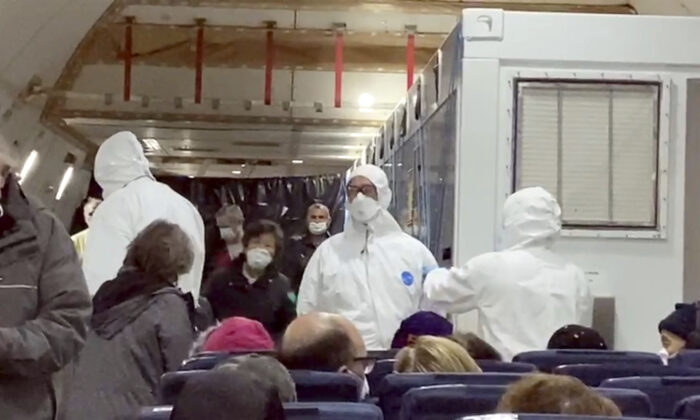Scramble to Track Cambodia Cruise Passengers After Coronavirus Case Reported
Dr. Michael Ryan, a top World Health Organization (WHO) official, revealed why the organization is not classifying the COVID-19 outbreak as a global pandemic.
“I think we need to be extremely cautious in using the term ‘pandemic.’ We had lots of controversies during the H1N1 situation, around when it was pandemic and when it wasn’t pandemic, and I think we need to be careful,” he said, referring to the swine flu virus.
A pandemic, Ryan suggested, would have to entail “efficient community transmission outside of China,” where COVID-19, or the Novel Coronavirus, is believed to have originated. He is the executive director of WHO’s Health Emergencies Program.
“At the present time, we’re not observing that. And as such, we’re not in a position to have that discussion. What we’re seeing is, again, as we’ve said previously, the majority of cases outside China have a direct link still back to China,” Ryan said in a news conference on Monday.
It’s important for his organization not to create “fear in the world” by labeling the outbreak as a pandemic, according to the official.
“We’ve said that the risk is very high in China, it’s high regionally and it’s high around the world. That is not, ‘the risk is high of a pandemic.’ The risk is high that the disease may spread further, and I think at face value, that is true,” Ryan remarked.
A day earlier, Dr. Michael Fauci of the U.S. National Institutes of Health said the outbreak of COVID-19 is on the brink of becoming a pandemic.
“It certainly is on the verge of that happening reasonably soon unless containment is more successful than it is right now,” Fauci told CBS News, adding that two dozen countries outside of mainland China have approximately 500 cases of the virus.
 A worker uses a thermometer to check the temperature of a customer as she enters a Starbucks shop as the country is hit by an outbreak of the new coronavirus, in Beijing, China, on Jan. 30, 2020. (Carlos Garcia Rawlins/Reuters)
A worker uses a thermometer to check the temperature of a customer as she enters a Starbucks shop as the country is hit by an outbreak of the new coronavirus, in Beijing, China, on Jan. 30, 2020. (Carlos Garcia Rawlins/Reuters)“Several of them,” he added, “are starting to get to the second and third transmission.” A pandemic officially means that there are several countries with sustained transmission from “person to person to person,” Fauci explained.
The World Health Organization several weeks ago declared the virus a health emergency of international concern.
The United States on Sunday had a total of 15 cases of the virus from California, Wisconsin, Massachusetts, Texas, Illinois, Arizona, and Washington State. However, that number rose on Monday after Americans who were evacuated from a cruise ship held in quarantine arrived in the United States.
Health officials said that 13 evacuees who were removed from the Diamond Princess cruise ship, currently docked off the coast of Japan, were taken to a hospital in Nebraska. Some of them showed signs of COVID-19 while others tested positive, officials said in a press conference on Monday.
The bulk of the cases are in mainland China, centered around Hubei Province and Wuhan, it’s capitol. Chinese regime officials have implemented lockdowns in dozens of cities, affecting hundreds of millions of people while triggering global supply-chain slowdowns. Last week, top White House advisor Larry Kudlow, said he was “disappointed” with how China has handled the outbreak. “The virus is contained in the United States. We don’t know if it’s contained in China,” he said.
This article is from the Internet:WHO Official Explains Why Coronavirus Hasn’t Been Called a Pandemic
University Tells Professors to Stop Sending Students for Coronavirus Tests Over Coughing
